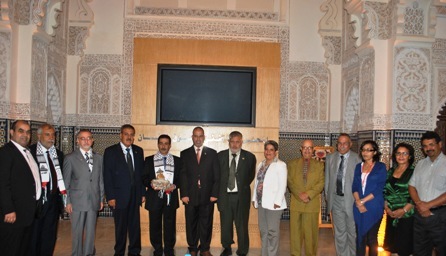CNDH SG and members of Palestinian reconciliation committee exchange on the experience of Moroccan truth commission
A delegation from the Palestinian reconciliation committee visited the Moroccan National Human Rights Council (CNDH) from 17 to 21 October 2011 to exchange on the Moroccan experience in the field of transitional justice, mainly through the experience of the Equity and Reconciliation Commission (IER).The Palestinian Reconciliation Committee is a national commission to launch a reconciliation process to elucidate the truth and establish a space for dialogue and democratic management of the political conflict in Palestine.
Mr. Mohammed Essabbar, CNDH Secretary General, warmly welcomed the delegation. He was happy to exchange on the Moroccan experience in the field of transitional justice.
He clarified that the settlement of serious human rights violations is not an easy task and requires a lot of wisdom. Transitional justice, as a non-judicial settlement, he added, aims primarily to repair the damage done through rehabilitation, reparation and adoption of new rules for better democratic management of political conflicts in a context of zero tyranny and repression.

On behalf of the Palestinian delegation, made of several government officials and civil society activists, Mr. Jameel Salama explained that the Palestinian disunity has led to the perpetration of some serious human rights violations and influenced relationship between the different components of society. This urged the creation of the Palestinian reconciliation commission to end this situation and take action to repair its effects.
Several points were scheduled during this meeting, including the Moroccan experience in the field of transitional justice, CNDH mandate, comparative experiences in the field of transitional, the Equity and Reconciliation Commission, the experience of the Independent Arbitration Commission, IER philosophy in terms of reparation, methods of truth investigation, role of civil society and rights holders in reconciliation, etc.
The delegation members visited different institutions, namely: the Mediator, the Parliament, Bayt Mal Al Qods Agency, the inter-ministerial delegation for human rights, in addition to several civil society associations. They also met with the heads of a number of CNDH administrative departments, such as the Protection and Assistance for Victims Department, the Regional Affairs Department, the Center of Documentation, Information and Training in the field of Human Rights, the "history, memory and archive" program (IER2) team and the Archive Department.






















